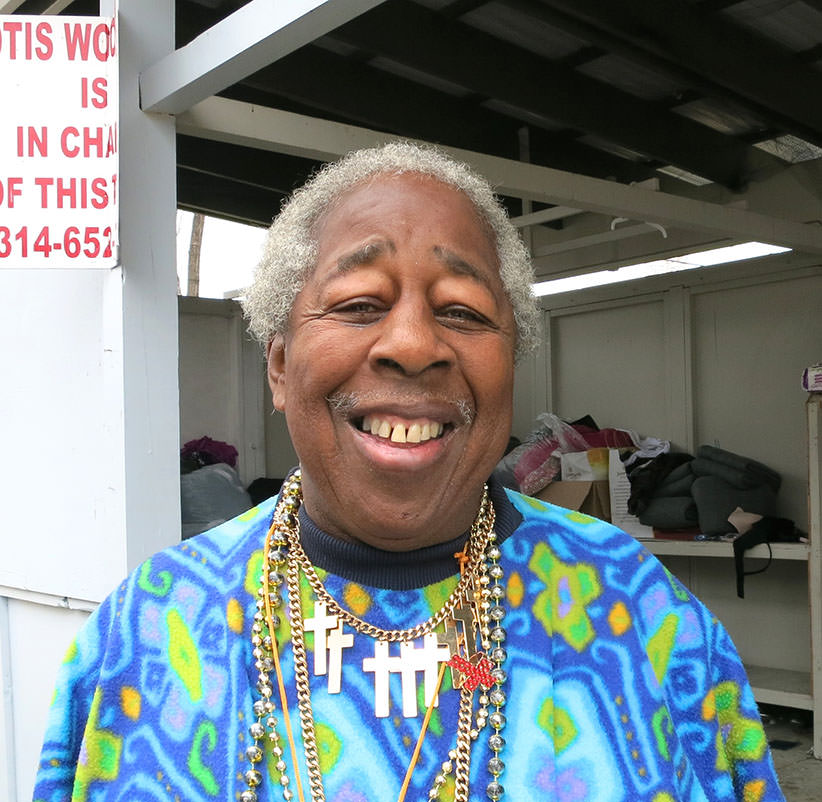
I was standing beside Dr. King. I was one of the guys who was carrying signs for the marches… April 4, 1968… He was shot… I told my wife, “There are so many hungry people…. If the Lord ever blessed me to feed us, whatever else I get over that, I will share with somebody.” I want to be a voice for people who are poor. To be that voice somewhere. To say, “Hey, we are out here. Don’t forget us.”
1. What led you to the mission of being a voice for the poor?
I’ve been doing this forty-six years. I didn’t think I was even going to be alive. That was the thing. I saw Martin Luther King at that church. I was sitting there watching him. (Click here to hear Otis’ first hand account of being with Martin Luther King before Mr. King died.)
In the beginning it was 1968 when it really dawned on me that I really needed to do something. That event happened on the fourth of April in 1968. I was standing beside Dr. King. I was one of the guys who was carrying signs for the marches they were going to have that 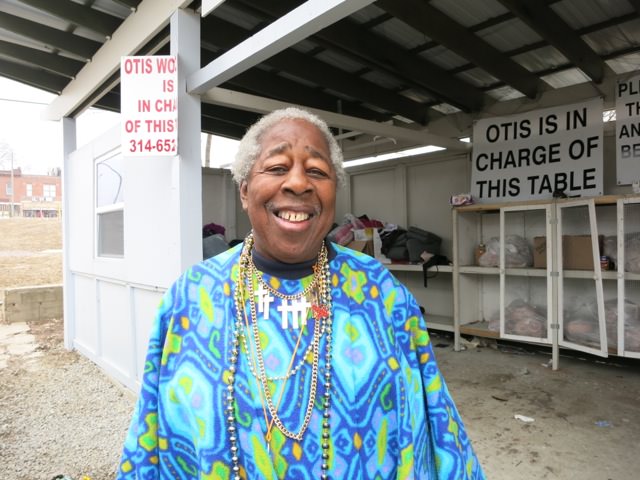 day. I was waiting on them to adjourn that all day thing that Dr. King was having meetings with different people who were a part of that garbage strike in Memphis. Mr. King was shot. He died. I had always said and I had told Dr. King that if he got killed that we would be like a tribe of Indians without a chief. We would be scattered out. I found myself here because of what I was about – I belonged to a group called CORE – Congress of Racial Equality – the people who were the law at that time – thought that I could lead an uprising. A riot. So I was under house arrest for the first few hours after Dr. King was killed. I decided that someone told me that I should get out of Memphis. I was standing next to him when he was killed, when the bullet hit him on the neck and tore his jaw. I was in my late twenties at the time.
day. I was waiting on them to adjourn that all day thing that Dr. King was having meetings with different people who were a part of that garbage strike in Memphis. Mr. King was shot. He died. I had always said and I had told Dr. King that if he got killed that we would be like a tribe of Indians without a chief. We would be scattered out. I found myself here because of what I was about – I belonged to a group called CORE – Congress of Racial Equality – the people who were the law at that time – thought that I could lead an uprising. A riot. So I was under house arrest for the first few hours after Dr. King was killed. I decided that someone told me that I should get out of Memphis. I was standing next to him when he was killed, when the bullet hit him on the neck and tore his jaw. I was in my late twenties at the time.
My wife was pregnant. I was getting warned that I should get out of Memphis for her to have her baby. They say, “Now how are you going to get out of Memphis?” The people around Dr. King were dying. His brother was found floating in the swimming pool. The judge that was handling it was found slumped dead at his desk. It was a bunch of things happening and people were dying. I was a little guy. I thought I wasn’t going to die because they weren’t even going to take notice of me.
But I wanted to get out of Memphis. We counted up our pennies and we had enough to get on the bus. I looked on a map and said St. Louis was the closest big city I saw. I could hide in that city. We got on the bus and we ended up on a Saturday evening walking from the  bus station to the middle of the city. We didn’t have no money. We saw the black people and we said, “We’re safe. Look at all the black people.” I think I would not have said that if I had known about the atmosphere here. I asked a lady if we could just set on the porch. I said, “My wife is pregnant and we just walked from downtown.” She said, “Yes. You can set on the porch.” But later on she said, “No you aren’t going to be comfortable out there.” She invited us to live on some blankets in her front room. That was my first night in St. Louis.
bus station to the middle of the city. We didn’t have no money. We saw the black people and we said, “We’re safe. Look at all the black people.” I think I would not have said that if I had known about the atmosphere here. I asked a lady if we could just set on the porch. I said, “My wife is pregnant and we just walked from downtown.” She said, “Yes. You can set on the porch.” But later on she said, “No you aren’t going to be comfortable out there.” She invited us to live on some blankets in her front room. That was my first night in St. Louis.
That Sunday morning when I got up, she was getting ready to go to church, so we had to get out of the house. I found an empty house right where Dr. King Boulevard is at Grand. There was a bed in the basement. I put my wife and little small children in there. I thought I would go and find us some food. But where do you start? Maybe I could look and see if people threw something in the trashcans. But then the trashcans in that area were bad. I saw all these people looking in the garbage and they were not even transient. They were people who lived here.
I got back without any food. I told my wife, “There are so many hungry people here. If the Lord ever blessed me to feed us, whatever else I get over that, I will share with somebody.” My simple motive was a little request from God, “If you give us a little food, whatever I get over that, anytime, I’ll feed just one person, two people – whoever – and I’ll be happy.” As it happened, I called that church in the middle of the service. I only had twenty-five cents to make the call. I asked them if they would pray for all the people who were homeless and hungry in St. Louis. They guy said, “Is that you?” I said, “Well, there’s a lot of us here. It’s not important who it is.” He said, “But it is you?” I said, “Yah.” He said, “Why did you call?” I said, “Because I’m a Lutheran.” He said, “I’m going in and I just happened to be by the telephone when it rung. Now if you give me 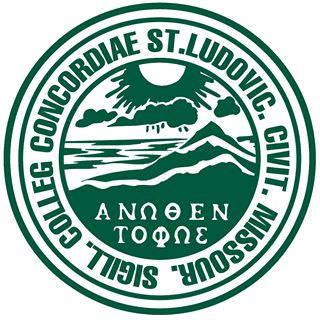 the number at the phone booth (at that time you could get a return call), if you can be at the phone when the services are over, I might have a job for you.” His name was Dr. Wonderlake. He was a professor there at the seminary. He was just visiting another church, Glendale Lutheran Church. He was visiting that church to be a guest preacher that day. It just so happened he picked up the phone and told me there was a janitor’s job at Concordia Seminary. If I could get there, the next morning he would tell them to hold that job for me. I walked from Grand Avenue out to Clayton – over fifteen miles. I didn’t know nothing about the city now. Forest Park covers the whole end of the city out that way. You’ll be amazed even after I got the job how I would get lost in Forest Park. I’d always add a couple of hours to walking to work – just so I’d get to work in case I got lost in Forest Park.
the number at the phone booth (at that time you could get a return call), if you can be at the phone when the services are over, I might have a job for you.” His name was Dr. Wonderlake. He was a professor there at the seminary. He was just visiting another church, Glendale Lutheran Church. He was visiting that church to be a guest preacher that day. It just so happened he picked up the phone and told me there was a janitor’s job at Concordia Seminary. If I could get there, the next morning he would tell them to hold that job for me. I walked from Grand Avenue out to Clayton – over fifteen miles. I didn’t know nothing about the city now. Forest Park covers the whole end of the city out that way. You’ll be amazed even after I got the job how I would get lost in Forest Park. I’d always add a couple of hours to walking to work – just so I’d get to work in case I got lost in Forest Park.
You work the first time and they hold the paycheck after that first week. It had been a week since I had got there and we didn’t have no food. I saw a little boy playing by the air conditioner in front of the library. I was cleaning. I said, “Boy, he’s going to go home and they’re gonna have some food and he’s gonna to eat a little bit off of it and then they’re gonna throw it in the garbage can.” I thought if I could just ask him, “Listen. You play here every day. If you could just tell your mom to dump some of the leftovers in a bag, she wouldn’t even have to separate it, then when you come to play here tomorrow, bring it back and give it to me.” I thought that maybe I could just get his leftovers. He didn’t come back. I guess he thought, “This is a bad place to play. People ask me for food.” I found out later he was Dr. Tietjen’s son — the president’s son – the president of the seminary. I found out later ‘cause this boy remembered the time when I asked for the food and he said he was so embarrassed that he 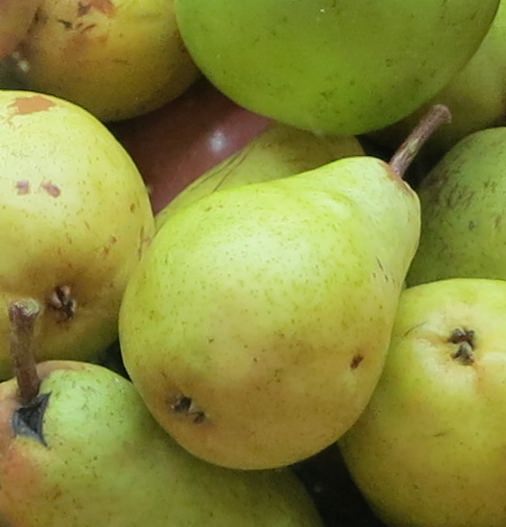 didn’t give me the food at that time.
didn’t give me the food at that time.
I started to see a seminarian who was there who asked me how I was doing. He was working and doing extra working to help with tuition. I told him I was doing fine if I could just wait ‘til payday and get some food. He say, “You need some food?” I say, “Yah.” He say, “You really need some food?” I say, “Yah.” He said, “Me and my wife we got some food in a little locker there and we’ll share it with you.” He had a car and when he got off work he put some food in his car and took us back down to that little basement shelter we were in. When my wife got the food, some of it was raw. She ate it just like it was — because she was so hungry.
He looked and saw where we were and said, “Ya’ll can’t stay here.” I said, “Well, that’s all I got.” He talked Dr. Tietjen and some other people into letting us come into the President of the Student Body to his little housing that they had there because it was empty at the time. I never forgot my promise and moved back to the city and started the Peace Park.
We started Lutheran Outreach here on this corner and have a Peace 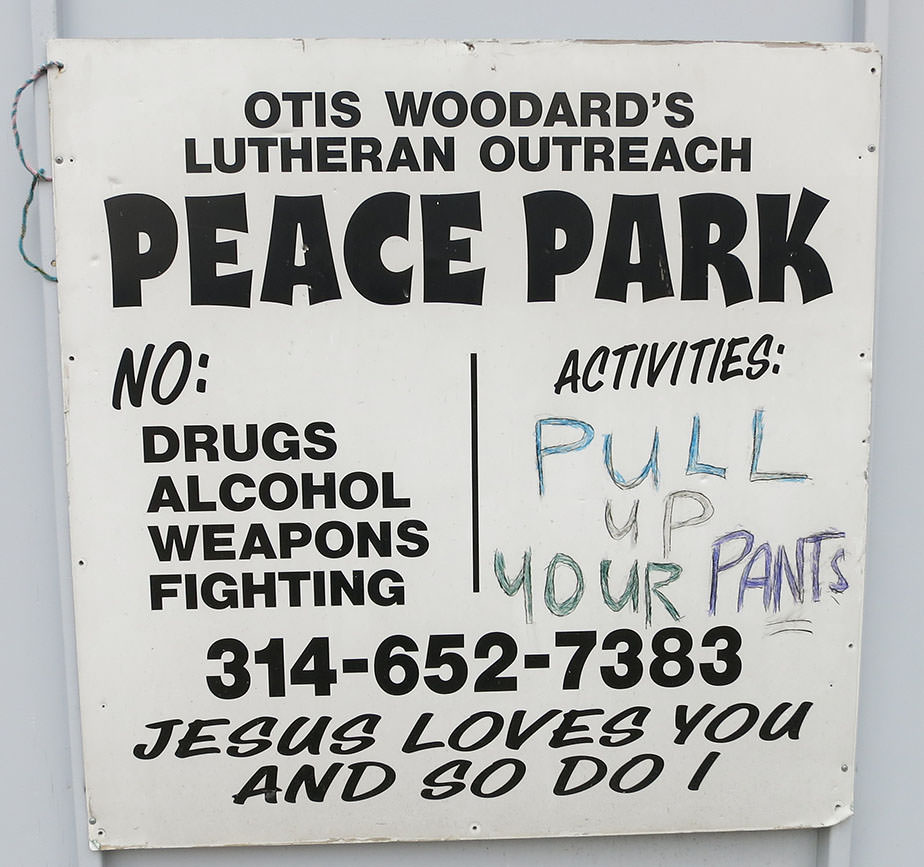 Park. I want to be a voice for people who are poor. To be that voice somewhere. To say, “Hey, we are out here. Don’t forget us.” There are some people who get out of poverty and even reach back. They are reminded that they were here once. I have people who come back here all the time and bring a couple cans of food or come back here with some diapers because they once had to ask for it. They come back.
Park. I want to be a voice for people who are poor. To be that voice somewhere. To say, “Hey, we are out here. Don’t forget us.” There are some people who get out of poverty and even reach back. They are reminded that they were here once. I have people who come back here all the time and bring a couple cans of food or come back here with some diapers because they once had to ask for it. They come back.
We don’t go on TV and advertise but when someone gives us twenty dollars to buy gas for our vehicle, I feel lucky. We’re not complaining. If you look at my Facebook, I have seventeen hundred people. They are people like you. They are from here to Guam. What they want to do is to know how to start. I tell them, “Well I just start doing it. A little table. A sign ‘For The Needy’. Google Otis Woodard St. Louis. I will spring right up. It will tell you everything about me – where to find me on Facebook, where to find me on YouTube, where to find me on everything.” (Also, see Otis Woodard singing at Lutheran High School.)
2. What does this mission mean to you?
It’s my thank you. Remember when I said that if God let me feed my family, that whatever else I could find I would share with those who are hungry? This is it. It might be a little complicated, but this is it – my, “Thank you Lord”. We eat. We have a warm house to stay in. We could have moved away from this house and neighborhood a long time ago. But I wouldn’t. It gives me an opportunity. That’s when you see people who are hurting and hungry, I see this as 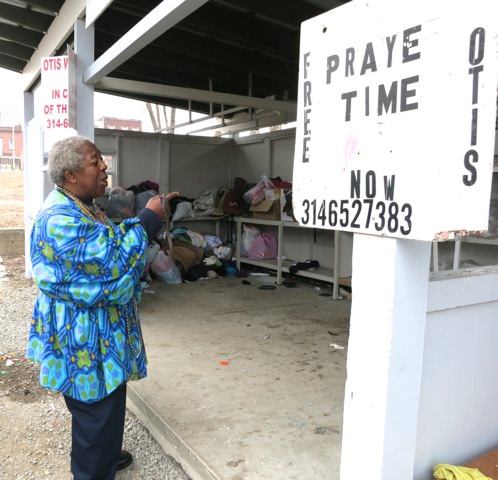 opportunity to tell the Lord, “Thank you.” Cause we don’t know who he is. We don’t know he or she or whatever.
opportunity to tell the Lord, “Thank you.” Cause we don’t know who he is. We don’t know he or she or whatever.
I heard the story that there were two sisters waiting for the Lord. They were cleaning up and were busy, and busy, and busy. Then a beggar man came knocking at their door and said, “Hey I need something to eat.” They said, “We’re busy getting ready for Jesus.” He came back in and said, “Can I have some water?” They wouldn’t give him none. They were too busy. They were nice, but they were too busy. To me, I always feel that when I see somebody — that could be Jesus. That could be the way he comes to me. I don’t know but I’m living in that expectation that any moment I am face to face with a little child, an old man, white, black – it don’t make no difference – cause I think that He could be with us anytime. The people who I serve today, they look at me and my clothes and for a minute I look at them and their clothes and their color – but as far as it matter to me when I give a couple of cans of stew that I’m going to give out today, I could be giving it out to Christ.
People have tried to put titles on me – every title you can name. I work for Lutheran Human Relations Association so they call me the 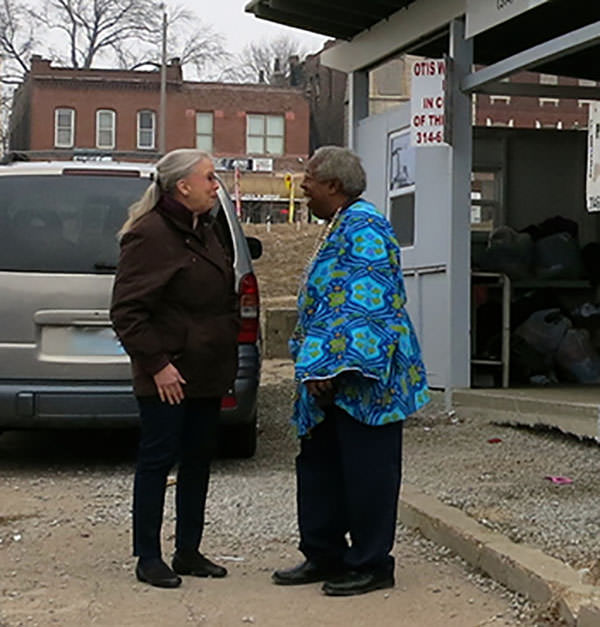 Minister of Reconciliation for Lutheran Human Relations Association. I was their “fire fighter” when they want to send a person to quench the fire. So what’s a fire fighter? When they have some burning thing and they want to send a person to quench the fire a little bit, they send me. OK. So the fire would be this. A lady went and asked about a school. It just happened that there were no black people at that school and the woman was black. She just went into the office to get some pamphlets to make a decision. The town got tense. The school got tense. So someone said, “Bring Otis here and have a school meeting and let him talk to us.” They had a question about blacks. So they invited me. That’s the fire.
Minister of Reconciliation for Lutheran Human Relations Association. I was their “fire fighter” when they want to send a person to quench the fire. So what’s a fire fighter? When they have some burning thing and they want to send a person to quench the fire a little bit, they send me. OK. So the fire would be this. A lady went and asked about a school. It just happened that there were no black people at that school and the woman was black. She just went into the office to get some pamphlets to make a decision. The town got tense. The school got tense. So someone said, “Bring Otis here and have a school meeting and let him talk to us.” They had a question about blacks. So they invited me. That’s the fire.
So let’s look at today. Last night there was a real fire and I went and took blankets and some pamphlets. Then there was a shooting that I went to just so I could keep the gangs from retaliating. It can be anything. I call myself the “gospel after the benediction”. That’s what I really feel. It’s when you go and you hear the words of the Gospel and then after you hear them you try to put legs and arms on them. He says, “If you want to love Christ than you want to love people who are out here. You love people who come to you and say, ‘I’m hungry and I don’t have no clothes and I don’t have no where to stay.’” That’s your time when you can make Jesus words operational.
3. What was your best day being a voice for the poor?
It was that day when the seminarian brought us some food. That was a hallelujah moment! Seeing my wife and children eat that food – I couldn’t even eat it for a moment. I just had to watch them and feel relief that I had that I am always assured that Jesus knows where we are. He is watching. No matter where we are, what the situation, in a little hole in a basement, he knows we are there. The things that were happening to me were getting me prepared for this moment.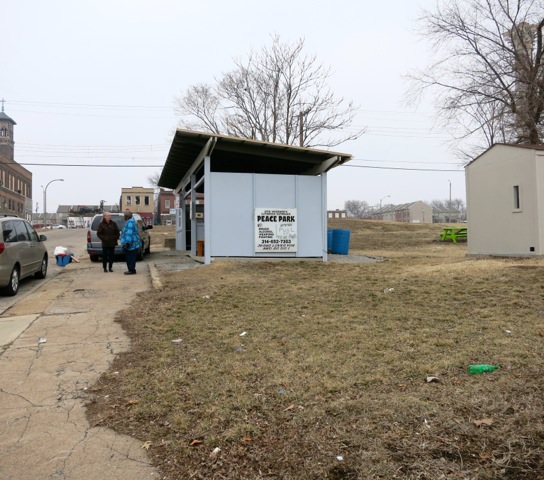
My best day on this corner, I had set a little table on this corner and I was giving out food every day. Some people saw what I was doing. They said, “What would you say if we helped you and put a nice place to do that?” I was amazed and I didn’t even know what they were talking about. I didn’t know it would be that big. This was it. (See picture to the right.)
My home got hit by lightening and burned. So my house was the house with the seven gables and was built for the 1904 World’s Fair. But I said, “This ground is real sacred for me. But I have not paid for this park. I thought, “Wouldn’t this be a good place for this peace park?” I lived near here with my family. This park could be a place where when they get in trouble, if they could get on this property, this park of mine, that I have taken, they would be safe.” I wanted to guarantee them a margin of safety. That’s all. I said, “If you run and get to this park, you’ll be safe.”
There were some kids that did a video of this. It showed where when someone is hurt they can run and come and find me at this park. 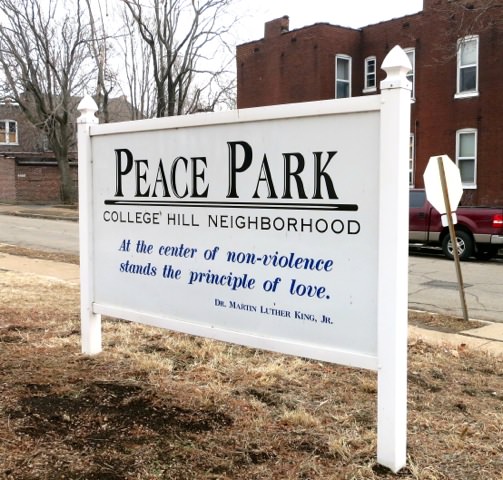 When people are running from gunshots, I’m running toward them. There was a guy who got shot up there on the corner. They blew his chin off. I got up there and he was laying on his back. The blood was going in his windpipe. I reached down there and got hold of him and was trying to take some of the clot of the blood that was clotting him in his windpipe so that he could get air down there. I noticed that people were running away. It was like people throwing a rock in the stream. People were going every which a way except coming toward me. I was yelling, “Someone come and help me. Call the police. Call the ambalance.” Then I noticed that everyone was running away from me. Later on I found out that the reason they were running away from me was that the guy who shot him was trying to get another shot, but he couldn’t get it because I was laying on the top of him pulling blood out of his throat. He is alive now and has a prosthetic jaw and face.
When people are running from gunshots, I’m running toward them. There was a guy who got shot up there on the corner. They blew his chin off. I got up there and he was laying on his back. The blood was going in his windpipe. I reached down there and got hold of him and was trying to take some of the clot of the blood that was clotting him in his windpipe so that he could get air down there. I noticed that people were running away. It was like people throwing a rock in the stream. People were going every which a way except coming toward me. I was yelling, “Someone come and help me. Call the police. Call the ambalance.” Then I noticed that everyone was running away from me. Later on I found out that the reason they were running away from me was that the guy who shot him was trying to get another shot, but he couldn’t get it because I was laying on the top of him pulling blood out of his throat. He is alive now and has a prosthetic jaw and face.
4. What was your worst day being a voice for the poor?
There are so many. The fire. Maybe the fire. Me and my children were sleeping in there. Boy. I woke up to a fire. Someone had set. The gangs were a long time trying to run me off the corner. Some gangs protect me, but there are some people that resented that I had 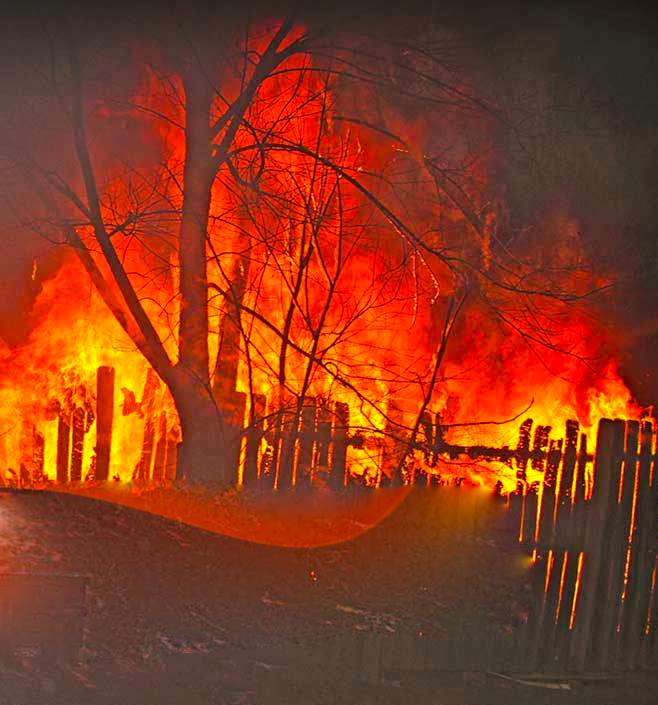 taken maybe the best corner you could sell drugs on. So I had a bunch of incidents – including my car being blown up.
taken maybe the best corner you could sell drugs on. So I had a bunch of incidents – including my car being blown up.
This one incidence, I woke up to all this fire. My children were upstairs. I had to go through this fire to get to the steps to tell them to run down. The fire was between me and them. I told them they had to jump up through the fire – including one little boy and he had to jump through the fire to get to me. They had to trust me enough. They said, “But dad, all this fire.” But they had to jump through there. I got them out the back door and reached for the telephone to call the fire department. My telephone was melting. I told the lady, “Mam it’s a fire.” I was trying to talk and smoke was coming up. I was saying, “Come to this address. Mam. The fire is melting my phone.” She said, “The fire is melting your phone? You get out of there.”
I found out I was on fire. My clothes and all were on fire. So I ran 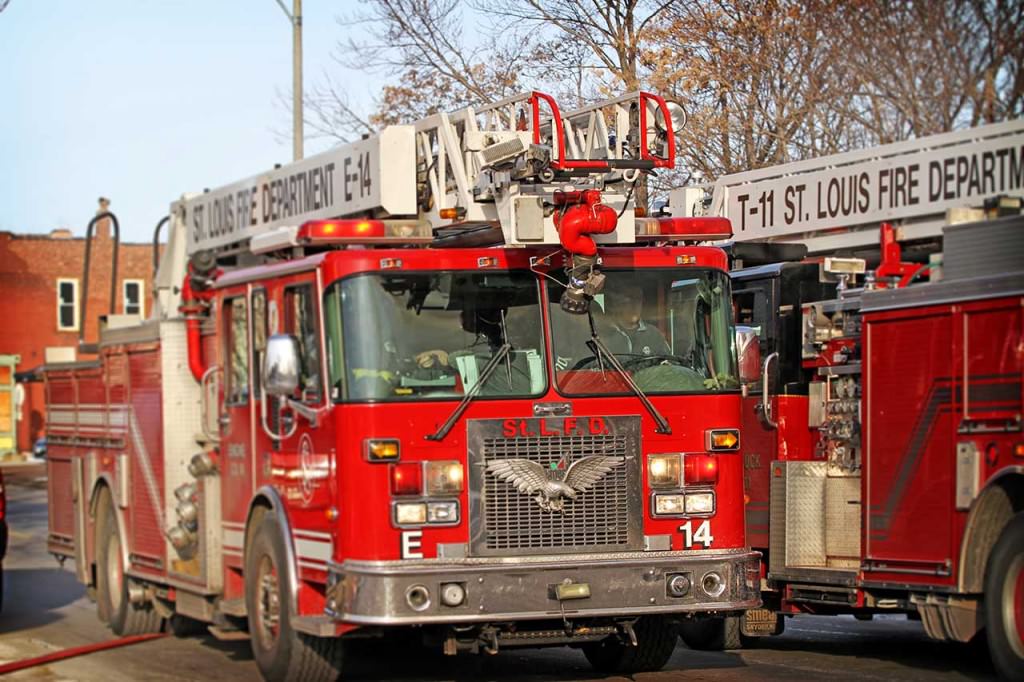 out the back door ripping off my clothes. By the time I ripped the last piece of burning clothes off, there was a policeman with a great big flashlight. There was a woman there. The policeman shined his light on me and she couldn’t see I was naked because all this steam was coming off me I was so hot. I was interested in whether I got all my children out. She was screaming, “Call an ambulance, Otis is burned.”
out the back door ripping off my clothes. By the time I ripped the last piece of burning clothes off, there was a policeman with a great big flashlight. There was a woman there. The policeman shined his light on me and she couldn’t see I was naked because all this steam was coming off me I was so hot. I was interested in whether I got all my children out. She was screaming, “Call an ambulance, Otis is burned.”
Fortunately all that was singed was my moustache and my hair. I was singed. That was a miracle. This woman was trying to get me in the car. I was nude. Even the policeman was crying. He knew me. The people knew me. She said, “Otis is OK.” She shined the light on me in the car. The fireman was saying he was going to go in there to get me out. But I was out and all my children were safe. Then the Red Cross came and gave me a blanket. The sun was starting to rise.
A man came up to me and said, “This is such a bad time. I was going 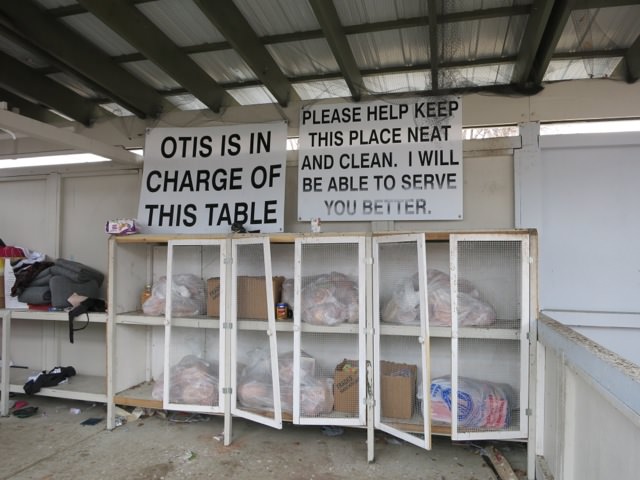 to come up here this morning and my family needed food.” All I could do was laugh. This was the Lord getting my mind off this fire. I said, “I can give you some food!” He distracted me. I was just so happy that I could still operate. That I could still function. That I could still function. No matter what. I could still do God’s work. Fire. Gunshots. Don’t make me no difference. The Lord sees me through in the end.
to come up here this morning and my family needed food.” All I could do was laugh. This was the Lord getting my mind off this fire. I said, “I can give you some food!” He distracted me. I was just so happy that I could still operate. That I could still function. That I could still function. No matter what. I could still do God’s work. Fire. Gunshots. Don’t make me no difference. The Lord sees me through in the end.
My house was burned down and some of the things melted to my body when I was trying to get out. The Red Cross came and gave me a red blanket. I kept it and wear it and someone put a hole in the top and I still wear it – my Red Cross blanket. They thought that was so funny that my first shirt after the fire was a Red Cross blanket.
I was diagnosed with cancer and the doctor said I wasn’t going to live two years in moderate pain but that third year I was going to be in crucial pain. He was crying when he was telling me this. That was fifteen years ago.
5. How did you survive your worst day?
I don’t tell people about my harder times because they’ve got theirs. Mr. King and I were were both locked up. He was sitting on the floor in the gym like he usually is. He used to sit there and write. We never figured where he hid his pencil and paper. He always had something to write with because the people who were jealous stuck us with all sorts of sharp things and pencils were one of them. Mr. King was setting on the floor. I had been struck. I was walking around like a mad tiger. I was holding my shoulder because this man 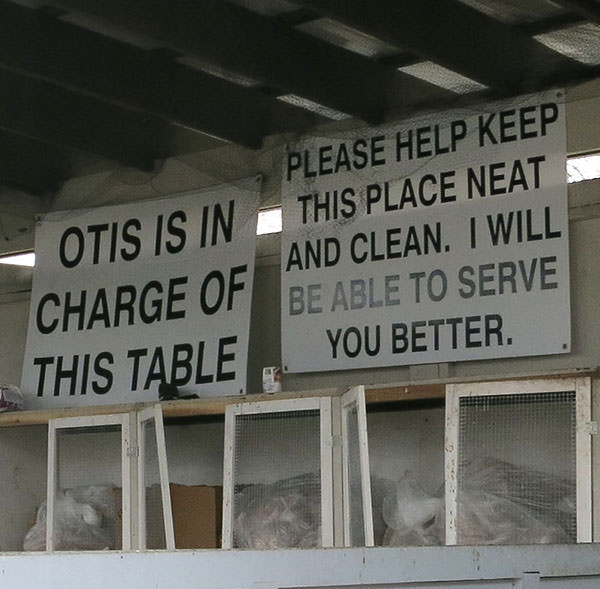 had run out of the crowd and hit me. I was saying, “We done proved that we can take the insults, that we can take the name calling, and we can take the hits, pouring coffee on us in places where we sat.” Mr. King said, “Love is gonna win.”
had run out of the crowd and hit me. I was saying, “We done proved that we can take the insults, that we can take the name calling, and we can take the hits, pouring coffee on us in places where we sat.” Mr. King said, “Love is gonna win.”
After the fire, my whole place was restored. I want to make it a place for a first start. I call it a first start when a woman gets out of the hospital and she has her newborn baby and she’s been living in a basement or abandoned house. This could be a place they could bring them and stay while they both recuperate and get well and while we look for another place where that baby can be safe – rather than going back to a shelter place.
I found that people are just waiting on the idea to help out. They don’t want these mothers to go back to places that have lead poisening. Some of the mothers have Cesareans and they need healing and need to get well and they don’t have running water or a bathroom.
We need everything you can’t get with food stamps. I told a whole school once, “Put a pencil and pad beside your bed before you go to sleep. In the morning, everything you use to get yourself ready to go to school, write it down – because I need it. A toothbrush. Mousse for my hair. Deodorant.” We need baby diapers, underwear, sanitary napkins.
You would be amazed at what people do to have a place to spend the night. That’s something that we need to remedy. People have to sacrifice and they tell me horror stories about how women and their 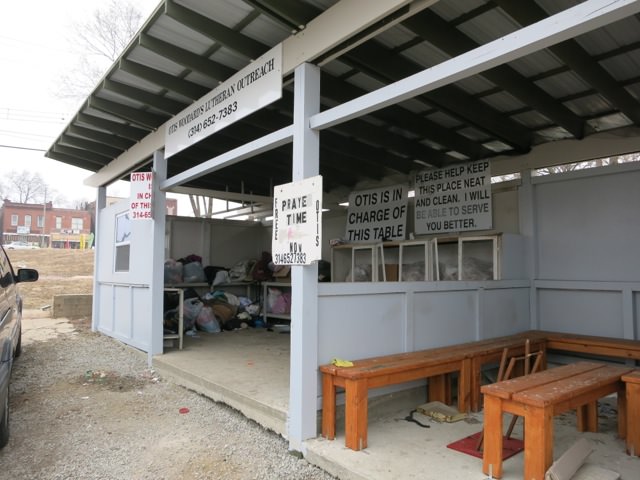 children have to really sacrifice to get a place to sleep. In the evening, it gets more desperate. I concentrate on women with little babies because they will stay outside in the cold. There might be fifty homeless kids at a time. I went around and founded children who needed shelter the worse. There are needy mothers, but I’m looking for the children too. I put them all together and give them about six months to help them get them selves on their feet. The little children living like nomads from one place to another. Sometimes this time a day, a mother not knowing where they’re going to sleep tonight or what they’re going to eat tonight.
children have to really sacrifice to get a place to sleep. In the evening, it gets more desperate. I concentrate on women with little babies because they will stay outside in the cold. There might be fifty homeless kids at a time. I went around and founded children who needed shelter the worse. There are needy mothers, but I’m looking for the children too. I put them all together and give them about six months to help them get them selves on their feet. The little children living like nomads from one place to another. Sometimes this time a day, a mother not knowing where they’re going to sleep tonight or what they’re going to eat tonight.
I thought that fitted into Dr. King’s way of thinking. How can a person fight for equal rights and fight for all those things if they are hungry? If they homeless? People tell me, “Well why don’t they go and find a job?” If their children are sleeping in a vacant house and they leave and the division finds their children, then they take the mother, and the children don’t have no income at all. The lady will have to spend money in court to get her children back. So it’s a Catch 22. It’s always something to keep them down. What they call the cycle of poverty. They get raised up and don’t get the education. They grow up and their children go through the same thing. Their children go through the same thing. Once they get caught in that big spiral, they can almost inherit poverty. Inherit. That’s all they know. I have to sometimes wean people off of getting help. After they have been helped, they start building us into their income. They actually build us into it.
I learned that you really have to call on the Lord. The Lord has plans 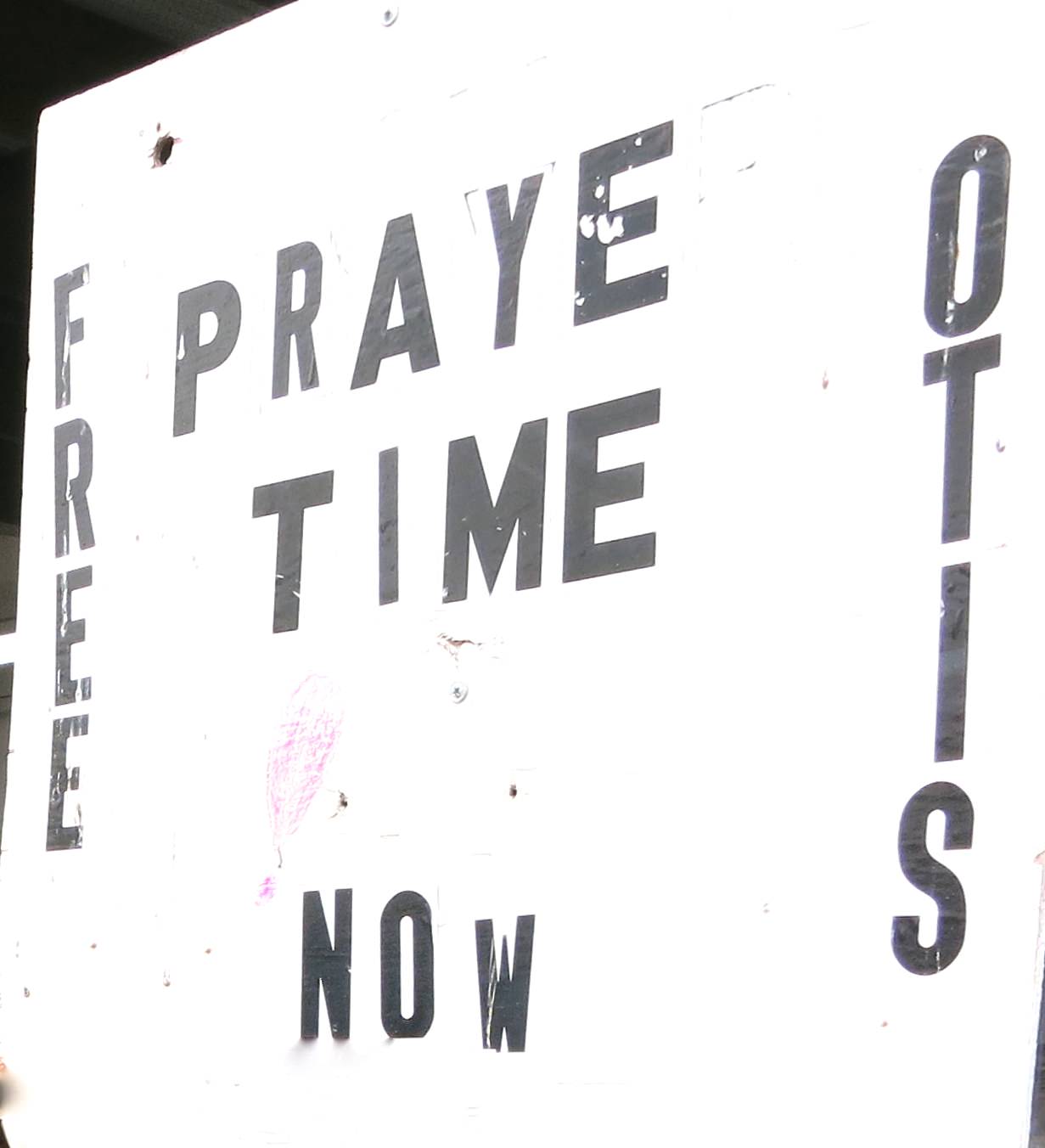 for us. We don’t understand them. We really have to reach down and find that trust. We say that the Lord sees this and maybe in the plan of things, this was in the plans. We’re gonna go through it. We’re going to be on the other side of this. I know that this place here is not the final place. I know that there is going to be a time when there is no sickness, no death, no poverty. I know that the Lord has a fishing place up in heaven because he knows that I like to fish. I could just fish and be with my sister Jean. I love her so much. I love her with all my heart. She’s been my voice from home. She asked me if I’m OK every day and she prays for me every day. I pray for her. We’ve seen bottom. We know what bottom is. We thank God every day for who we are and what we are.
for us. We don’t understand them. We really have to reach down and find that trust. We say that the Lord sees this and maybe in the plan of things, this was in the plans. We’re gonna go through it. We’re going to be on the other side of this. I know that this place here is not the final place. I know that there is going to be a time when there is no sickness, no death, no poverty. I know that the Lord has a fishing place up in heaven because he knows that I like to fish. I could just fish and be with my sister Jean. I love her so much. I love her with all my heart. She’s been my voice from home. She asked me if I’m OK every day and she prays for me every day. I pray for her. We’ve seen bottom. We know what bottom is. We thank God every day for who we are and what we are.
- « Previous person: Ted Piekutowski
- » Next person: Joe Groceman